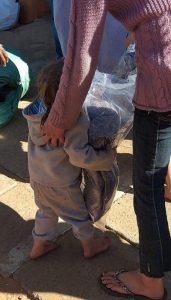
Umm Muhammed Umar
The Gauteng Department of Social Development failed to spend millions of Rand, leaving NGOs and NPO’s to take care of the vulnerable struggling to keep food on the table. The department’s annual report revealed that most of the programs were badly affected by the under expenditure of R17.9 million, and a further R13.2 million under spent on restorative services programs. Radio Islam spoke to Cradle of Hope’s, Melodie van Brakel, about the impact of this and people on the ground. Cradle of Hope’s is a non-profit organisation in Krugersdorp, founded by van Brakel, for abused women and children.
Van Brakel said that the underspend by the department was heart-breaking in light of the challenges faced on the ground. She said that it was a regular occurrence every year, for the past four years. Van Brakel said, “They’ve been an under spending of more than R1 billion in the department in total, and it’s just not acceptable that this money goes back to the Treasury.” She added, “the excuses are computer glitches, or COVID, a nice one that everybody uses these days.” She said that NGO’s were really struggling across the board due to a lack of funding.
Is there any way that NGOs like yourself can do something about putting pressure to ensure that the allocated money spent?
To ensure that the allocated money is spent, van Brakel said that a few NGO’s that work together and communicate to try to pressurize the department. However, she added that at The Cradle of Hope, she, as the CEO as well as the board, had taken a decision several years ago to stop applying for funding from the government, as, “it’s a heck of a lot of paper, and it takes a long time and we were just declined funding every year.” She added, “We were told that there’s no money, and then also, sometimes after we applied, a couple of months later we would ask what’s happening with our application, and our forms would have been lost, our application was missing. So, we decided that we will just trust God for funding and not apply for government funding anymore.”
Van Brakel explained that many of the NGOs that she knew were being funded by the government are struggling severely, “because they have also got expenses, they’ve got salaries to pay, and running costs and petrol, and vehicles to get the children to school. She said that for those to function was impossible as they just did not have the funds to do so. She lamented, “the department is completely inadequate. And there’s a zero-care attitude and this is just inhumane.”
Commenting on the difference the money could have made, had it been spent, van Brakel said that there were currently so many poor and vulnerable people, that the need was overwhelming. According to van Brakel, the Cradle of Hope receives hundreds of requests for food parcels, from across the country, daily. This was more than what the NGO could cope with. Van Brakel said that they normally hand out 250 food parcels every Monday afternoon, but this past Monday, after having handed out 350, they stopped counting. She said that they had had to pack the stock that they had been saving for the end of the month, “because the people are hungry today”. She added, “to see the hunger and desperation in these people’s eyes – they’ve lost their jobs, many of them have lost their places of stay, some of them are living in their cars. They just can’t find work at the moment.” Van Brakel said that the people who come to collect food parcels were so undernourished that the deterioration in their health could be seen. She said that of the underspent money, one part had been allocated for food parcels for people who are on antiretrovirals. According to van Brakel, it was essential that people on ARV’s eat, and so, Cradle of Hope receives numerous requests from people who are on ARV’s for food parcels. Van Brakel said, “So, it really traumatizes us on a daily basis to look into the eyes of these hungry people, to feel the cold hands when they take the parcel.” She said that it was stressful that the humanitarian needs and basic rights of the needy, such as food, medical care, and clothing were unable to be met.







0 Comments